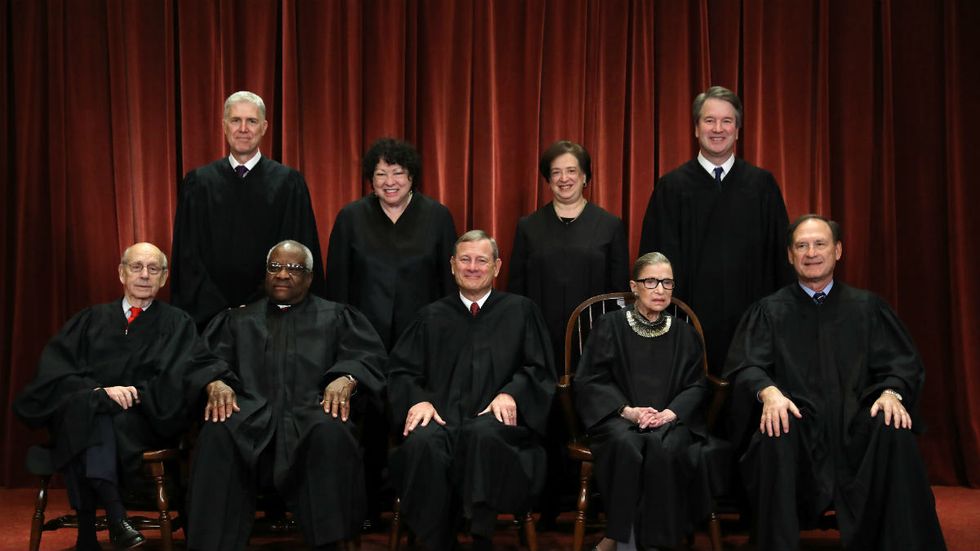
© 2024 Blaze Media LLC. All rights reserved.
The upcoming Supreme Court session could have major implications for school choice and religious liberty
July 08, 2019
The Supreme Court is done for the session, but when it comes back, its members will hear a case that could have massive implications for educational freedom across the United States.
Before closing up shop until October, the court agreed to hear the case of Espinoza v. Montana Department of Revenue, which deals with whether or not a Montana rule that blocks school choice scholarship funds from going to religious schools under a "Blaine Amendment" is constitutional under the Free Exercise and Equal Protection clauses.
Currently, a 69-percent majority of the private K-12 schools in the state of Montana are religiously affiliated, and "excluding them severely limited the choices of families," claims a petition to the Supreme court from a trio of parents with children at religious schools affected by the decision.
"Petitioners Kendra Espinoza, Jeri Anderson, and Jaime Schaefer are all low-income mothers who were counting on the scholarships to keep their children in Stillwater Christian School, a nondenominational school in Kalispell, Montana," the petition explains. "Although all three receive financial aid from the school, they still struggle to make their monthly tuition payments."
"Petitioners’ stories are not unique," the case continues. "They echo those of dozens of other families who are relying on the scholarships to make tuition payments, including families living in poverty and those with disabled children."
"If this rule were to be allowed to stand," explain Heritage Foundation policy experts Lindsey Burke and Elizabeth Slattery at The Daily Signal, "it would shut out a large percentage of schools from the scholarship program, limiting the options of families that relied on this assistance to send their children to the school of their choice."
"Blaine Amendments," like the one behind Montana's funding rule, are legal leftovers from the 19th century that were dreamed up during a fervor of anti-Catholic animus in American history and named after former House Speaker James G. Blaine. Whereas their former use was to keep Catholic schools from getting public funds, many now have the effect of blocking public funds to religious institutions of any denomination.
The court handed down its ruling on a similar case out of Missouri just a couple of years ago.
In a 7-2 decision toward the end of June 2017, the high court ruled that the state of Missouri could not exclude Trinity Lutheran Church's playground from a program to replace playground gravel with safer, recycled tire scraps, and that doing so was a violation of the Free Exercise clause.
“The Free Exercise Clause ‘protect[s] religious observers against unequal treatment’ and subjects to the strictest scrutiny laws that target the religious for ‘special disabilities’ based on their ‘religious status,’” Chief Justice John Roberts wrote in the majority opinion.
But the majority opinion was an explicitly narrow one and was limited to the case at hand. Justices Clarence Thomas and Neil Gorsuch wrote a separate concurrence arguing that the same principles should be applied to other cases of religious discrimination.
"I worry that some might mistakenly read it to suggest that only 'playground resurfacing' cases, or only those with some association with children’s safety or health, or perhaps some other social good we find sufficiently worthy, are governed by the legal rules recounted in and faithfully applied by the Court’s opinion," the concurrence warned. "The general principles here do not permit discrimination against religious exercise — whether on the playground or anywhere else."
Since then, Justice Anthony Kennedy — the court's infamous swing vote — has been replaced by the President Donald Trump-appointed Brett Kavanaugh, leaving open the possibility of an even broader, precedent-setting ruling than in the case of Trinity.
#mc_embed_signup{background:#fff; clear:left; font:14px}
/* Add your own MailChimp form style overrides in your site stylesheet or in this style block.
We recommend moving this block and the preceding CSS link to the HEAD of your HTML file. */
Want to leave a tip?
We answer to you. Help keep our content free of advertisers and big tech censorship by leaving a tip today.
Want to join the conversation?
Already a subscriber?
more stories
Sign up for the Blaze newsletter
By signing up, you agree to our Privacy Policy and Terms of Use, and agree to receive content that may sometimes include advertisements. You may opt out at any time.
© 2024 Blaze Media LLC. All rights reserved.
Get the stories that matter most delivered directly to your inbox.
By signing up, you agree to our Privacy Policy and Terms of Use, and agree to receive content that may sometimes include advertisements. You may opt out at any time.



